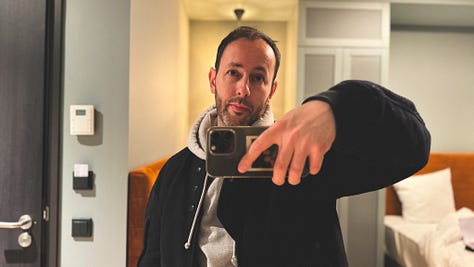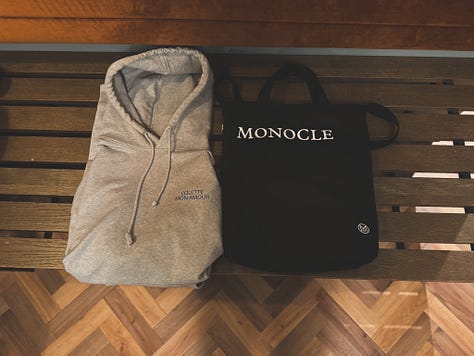In Practice: Laurent François Thinks the Internet Can Still Be Beautiful
On building for connection, resisting speed culture, and staying alive to the craft.
I found
the way you find a lot of people who matter now: quietly, online, without anyone pointing and saying “this is important”—you just feel it. I started reading his newsletter, Alive in Social Media, and realized he was often orbiting something I’d been turning over too, but he’d gotten there first, and sharper.Laurent has the kind of brain I trust immediately: steady, curious, serious about ideas without being performative about it. He’s spent his career moving between spaces most people would call luxury, strategy, or culture, but the real throughline is subtler than that: he’s someone who’s always been building for connection, even before we had the words for it. Long before "social" became an industry, he was mapping the early architectures of digital culture—and somehow, he’s stayed human inside it.
What I admire most is that he hasn’t collapsed into cynicism or speed.
There’s a wisened sense of rigor in how he moves: a respect for subcultures, a patience with story, an unwillingness to flatten everything into trends or templates. It’s rare now, and it’s why his thinking hits different.
In this conversation, we talked about how generosity rewires leadership, why real work outlasts reputation, and what it means to stay alive to the craft—even as the systems around it keep accelerating.



1. What’s the real story of how you got here? (Read: not the LinkedIn version)
I actually started creating online projects at a very early age. In 1999, I launched a poetry forum called Prose Combat. Back in the days, we were not talking about social media but I could feel from my countryside the power of connection. This project helped me realise that something was going on, with the Internet.
Later on, I wanted to work in diplomacy but quickly realised that the government structures were not necessarily for me. However, I had a chance to work for a French Cultural Institution in Athens and also launched a platform to connect young Greek creatives and cultural platforms. This digital grammar became a habit for me. I finished my studies and it was time to find the last internship. I asked my brother who I should work for in order to learn the so-called “communication”. He told me: you need to find a way to meet Natalie Rastoin, who was President of an agency called Ogilvy. I shared my resumé and the day after, I got a call from another Natalie. It was the beginning of my adventures in the adworld. I was about to leave for Google, but the PR agency boss came to my office and told me they were about to launch a social media department, and if it’d be of any interest for me. It was 2007. And of course, I jumped on it. We were probably a dozen in the world with a strange "social media" mention in our job titles, and as we were there at the right time and in the right teams, we breathed the development of social media. Social listening was the backbone of everything we did at that time. Everything was a “first” or a “test”: no one knew where all this digital revolution was going (most of our counterparts in the tech world were less than 25 years old…) but we sure felt that it was a decisive moment.
Meanwhile, I kept on writing a lot, and we got into a magazine called L’Express with my friend Vu Quan Nguyen - we were running a fashion blog called Le Boulevardier, trying to decipher from an anthropological/sociological perspective the fashion world, while taking a lot of photos. As we were at the early stage of social media x fashion, it gave us a lot of visibility and access to amazing entrepreneurs, brands, and shows. Vu Quan was already at the avant-garde of fashion, so it was a daily source of joy and discovery.
Later on, I moved to London, and I co-founded an agency called RE-UP, the “home of creative misfits” with my business partner Pierre Humeau, who has brought an exigence and passion for the craft. It did not start in a garage but in a typical English room, with carpet and good energy, and guess what: we’d met in a London pub, and we were the only 2 guys not working in finance; the agency took off, we moved to new offices (just above Trendwatching), I started to use the Eurostar a lot, we got new daring clients, and luxury, fashion and beauty brands started to come. Most of them were extremely ambitious, with a desire to shake things up. Brexit occurred, we moved our HQ to Amsterdam, I went back to Paris, we survived COVID-19, we kept on growing, and then got acquired.
My story is made of lots of chances, serendipity, and unbelievable meet-ups. I live by the quote in the series Halt and Catch Fire: 'the thing that gets you to the thing it was you. It's always been about you".
So here I am, in a hotel room in Amsterdam just before a day of workshops at 180.
I feel lucky to keep being paid to think and create. A real luxury.
2. What’s something that quietly rewired how you work?
I tend to build my vision while I talk with other teammates. It’s how I find ways to articulate a point of view, a strategy, an idea. So, most of the teams I was lucky to be part of changed my initial thinking, assumptions, and misconceptions.
But a couple of people I look up to changed my life. The late Robin Carey, founder of Social Media Today, was one of the first to believe in me. The way she approached social media was truly…social. She constantly brought me these ideas that leadership, moving people, requires being extremely generous, to give a lot; that communities do feel, even behind the screen that an idea is genuinely beautiful and worth spending a bit of time with. John Bell at Ogilvy keeps influencing me. He used to have a very bold and rock’n roll approach to the work. He often said something like “when no one leads, you lead”, and pushed the first generation of social media specialists to mix media, explore, dive into subcultures, and accept the fact that we don’t know much except what we research for.
In high school, a professor of economics gave a little group of students free evening lectures, on Monday evenings, to prepare us for universities or Sciences Po. This man, M. Gabriel Trombert, proved to me that it’s not enough to have an OK brain; you need to craft, hustle, repeat gestures, and read, read, and read again. He was notoriously famous for making us summarise complex books, and he was very straightforward in his grading. He taught me that if you truly care for someone’s potential, you need to be even more exigent, even more sincere.
Then a lot of people rewire me frequently. My besties and my family are my first influences now. I spend hours texting and chatting with numerous people around the world. This way of thinking acts as a sort of active network of signals.
3. What’s a piece of media you’ve rewatched or reread an embarrassing number of times?
In 2013, I had just moved to London. I was waiting in the lobby of JWT London (where I was about to start a freelance gig). And I realised that my name was in Marketing Week, in a column by Mark Ritson, who was already a very famous man, and me, well, I was just starting. He quoted a paragraph of my personal blog without any kind of context, and truly used me for his classic rant against, well, you know the man.
I obviously tried to contact him but never got any kind of answer. It taught me that you need to be ready to be attacked big time if you’re a bit visible, and that you need to make sure that people can read the entire narrative. It’s true at personal level, it’s also true at brand level. The story, which affected me a lot at that time, was probably one of big reputation learning: the only thing that matters is the work, how you work, the quality of the work, and the impact of the work. That’s where your reputation comes from. The rest is only a digital bite. “In the long term, we’re all dead” said Keynes, and you’d better be kind and impactful if you can. It was so embarrassing but now I find it very ironic. Irony, oh irony!
4. What’s an opinion or trend in the industry that makes you roll your eyes?
The idea that “Gen Z is…” anything. Too often, entire generations get flattened into one simplistic narrative—“They’re inclusive!” “They’re lazy!” “They’re reinventing everything!”
It’s reductive. Depending on where you live, your upbringing, your culture—you’ll find wildly different behaviors. Just look at voting patterns. Some are progressive. Some aren’t. It’s not about age.
And when Gen Z does do something amazing, it’s not just because they’re young. They’re doing the work. And that deserves more credit than generational labeling.
5. What’s a moment in your career that you felt totally in control? What about the opposite?
In 2022, we launched an activation for DIOR with Jisoo, the very first WhatsApp campaign dedicated to the super fans of Jisoo and Dior. The mechanism was everything I believe in: giving something special to a community, letting them take the time to take part in the experience, creating an affordance so conversations can occur, making people become actors and actresses of a kind of storyworld, in which they become active. Blend luxury fantasy machine, community, tech.
I sometimes feel less in control and even affected when you don’t have the same kind of generosity and honesty in large projects, in which politics, egos, but also some people can be frauds who actually jeopardise the value of your work. It’s not a creative vs non-creative thing. It’s more of an ethos issue. But it’s also precious: having a team you believe in, you will fight for, is unique. In creative work, you need to be able to reach a kaïros nearly every day. It can be very exhausting. But so rewarding as well.
6. What’s in your media diet right now that’s actually influencing your work?
Substack, of course, has changed my media journey. I think the authors there bring things that are less clickbait-esque.
It’s as if Tumblr, Reddit, museums, and conferences had decided to fuse to create intellectual substance. My recent addiction is to buy old magazines on eBay (like the 1st issue of Monocle) but also old fashion catalogues, books etc. I recently acquired some Hermès “Le Monde d’Hermès” issues, an annual book from Opening Ceremony and various other markers of an era. I love the tangibility of print.
7. What’s a shift in tone, taste, or language that you think is coming—but hasn’t hit yet?
I suspect we’ll see a return to limited data offerings for mobile internet. Usage has become overwhelming, and one way to restore value might be through intentional restriction.
Also, I think older internet users are going to start shaping the culture more visibly. They're active on TikTok now, often playing the "funny older character," but I believe they’ll soon influence through expertise like watchmaking, arts, literature. Age-based hierarchies are already dissolving in some communities. The next shift might be intergenerational influence moving upstream.
8. What’s something you wanted early in your career that doesn’t matter to you anymore?
I wanted everything immediately: millions, fame, power. Now I realise that what I have is priceless, especially as we’re just human beings after all. Sounds very candid and naive but I feel immensely lucky now. Very alive. Especially when I see some sparks in my kids’ eyes.
I hope you enjoyed meeting
. Catch up with him on LinkedIn.


thanks so much for this opportunity Nikita!
To the dreamers, and believers! :)
my very first 'fashion adventure' wouldn't have been the same without this man and his camera -- will never forget (and yep, that tells a lot about his mindset around 'connection') :v: